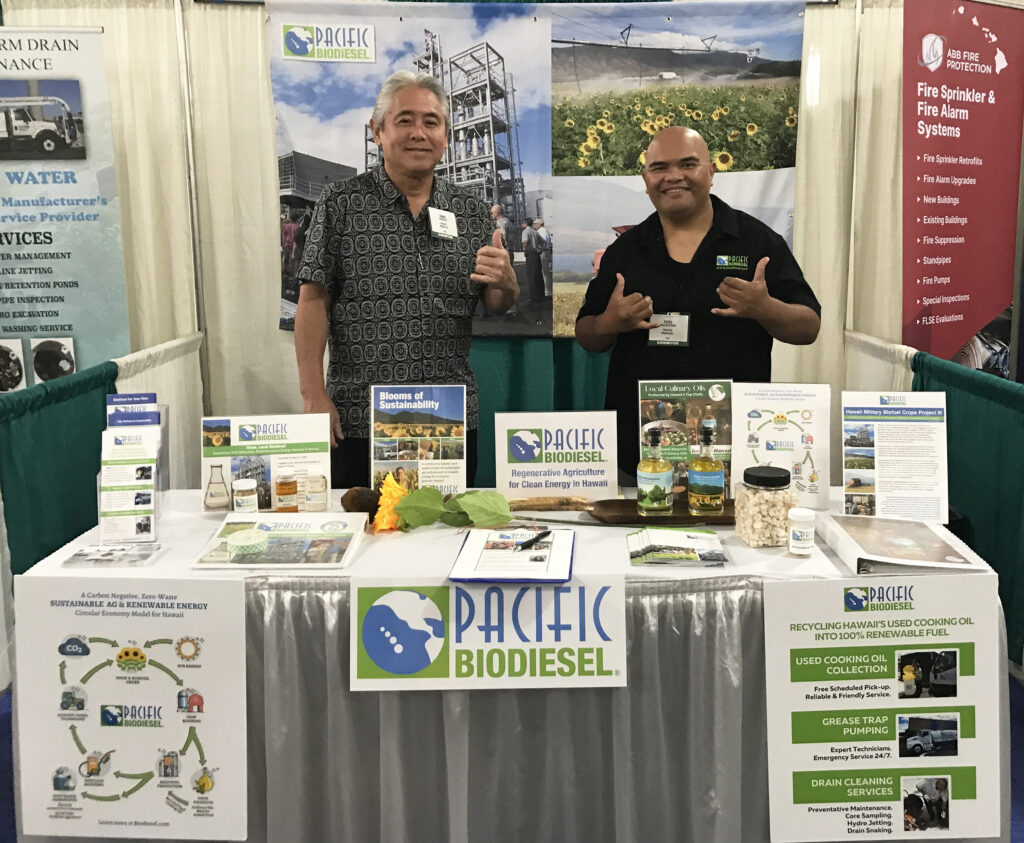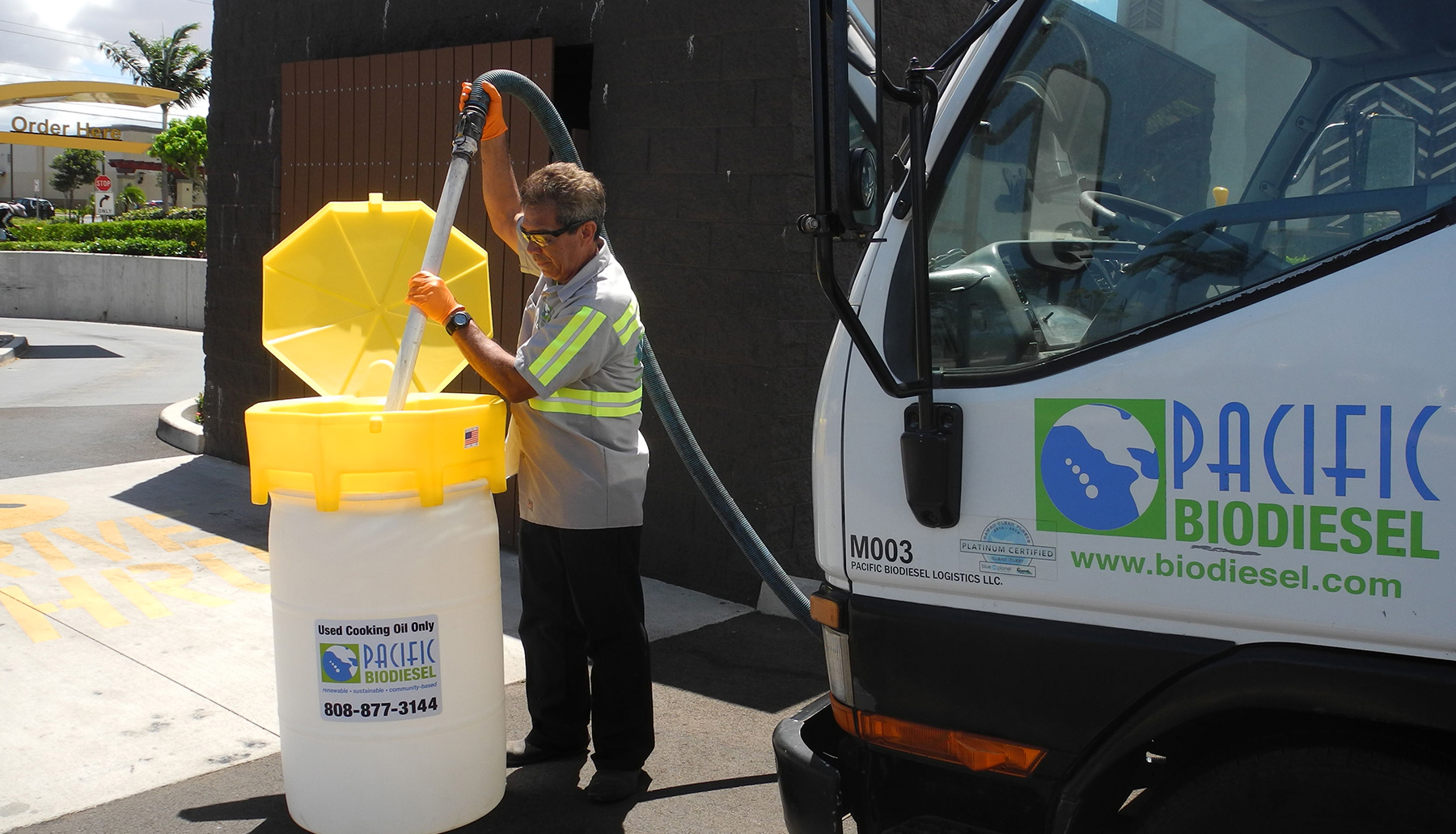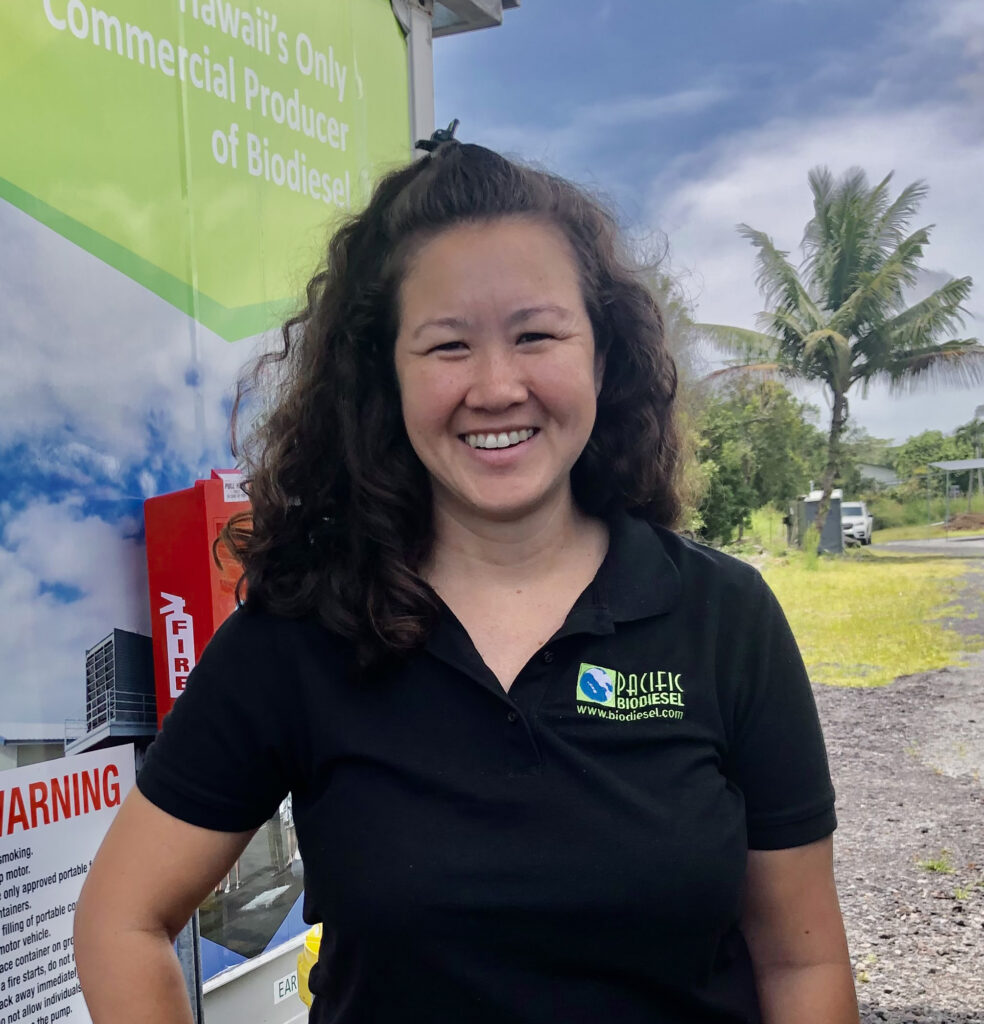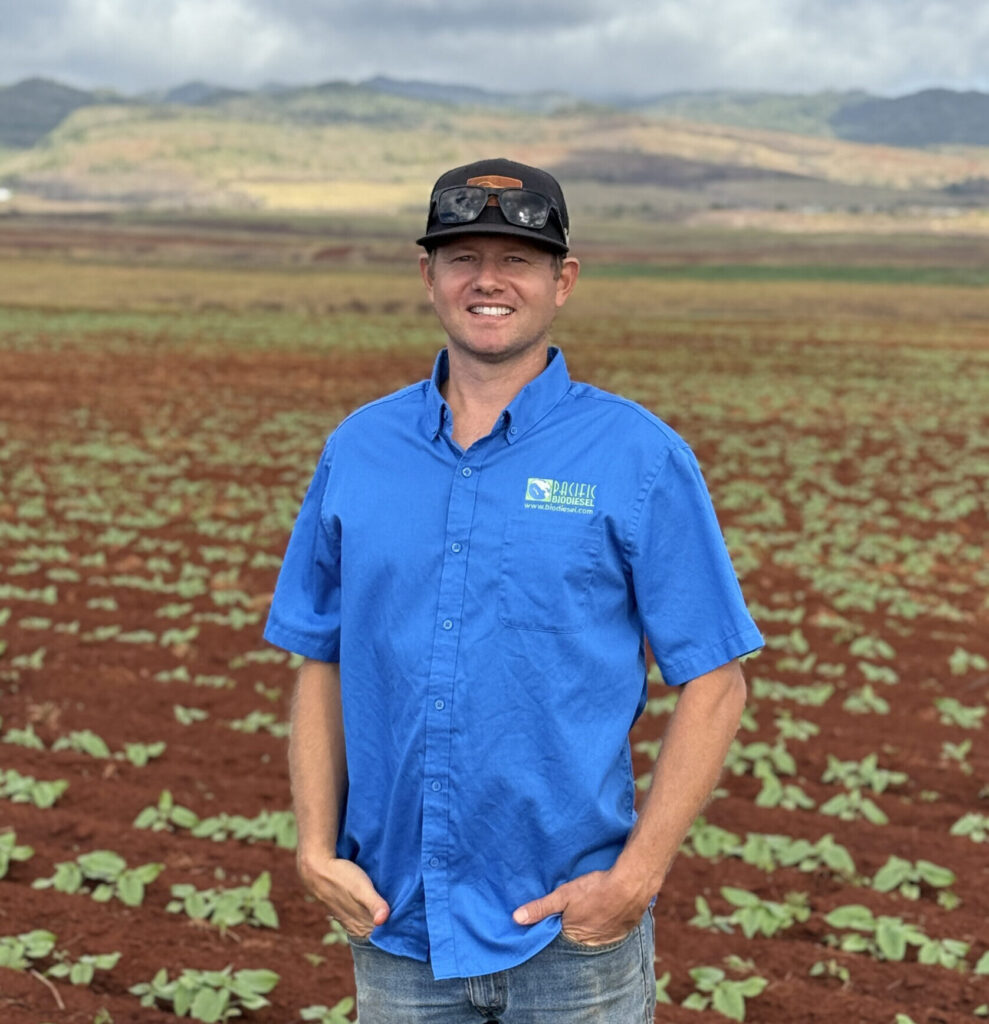Biodiesel Pioneer Marks 30 Years of Recycling Hawaiʻi’s Used Cooking Oil
As we say in Hawaiʻi, it’s a kākou thing.
Pacific Biodiesel produces its 100% renewable fuel by recycling used cooking oil (UCO) from Hawaiʻi’s restaurants. For each gallon of UCO recycled, nearly one gallon of biodiesel is locally produced. Also, recycling UCO keeps this waste out of Hawaiʻi’s landfills, extending the life of landfills and reducing ground water contamination.
“Hawaiʻi’s restaurants may not realize this, but by recycling their UCO with Pacific Biodiesel, they are part of the renewable energy solution for our island state,” said Dana Shinsato, Fleet Manager for Pacific Biodiesel. “By working with our local company, restaurants are making a positive impact on the environment and our local economy.”
For Hawaiʻi’s restaurant industry, Pacific Biodiesel collects and recycles used cooking oil, providing free pick-up and customizable containment solutions. Grease trap pumping and drain cleaning, emergency pumping, and preventative maintenance programs by its experienced technicians are also available.

Pacific Biodiesel Fleet Manager Dana Shinsato and Neighbor Island Dispatcher Ferdinand Ballesteros welcome attendees at an industry trade show.
Local restaurants have been at the heart of Pacific Biodiesel’s community-based production model since Day One – three decades ago.
“This year marks an exciting milestone for Pacific Biodiesel – 2025 is our company’s 30th Anniversary. We are the nation’s longest operating biodiesel company and still Hawaiʻi’s only commercial producer of liquid biofuels,” said Jenna Long, Pacific Biodiesel Operations Director, in the company’s January newsletter. “From opening the first retail biodiesel pump in the USA three decades ago to farming the first commercial crop of sunflowers on Maui, Pacific Biodiesel continues to find new ways to move forward with our community-based model of renewable fuel, and expand circular economy benefits in our island state.”
Pacific Biodiesel has designed and built more than a dozen biodiesel refineries around the world, and today Hawaiʻi remains its home base. The company employs 100 people statewide and its refinery on Hawaiʻi Island annually produces nearly 6 million gallons of distilled, premium-quality biodiesel sold entirely in the state.
Why does biodiesel matter for Hawaii?
Local biodiesel production supports Hawaiʻi’s mandate for 100% renewable electricity production by 2045. Biodiesel is a 100% renewable fuel that can be used in any diesel engine. The fuel is biodegradable, non-toxic and reduces harmful greenhouse gas emissions by 86% compared to petroleum diesel.
Over the past 30 years, Pacific Biodiesel estimates its impact here in Hawaiʻi:
- 70 million gallons of biodiesel have been produced for Hawaii, from its initial small-scale plant on Maui to its world-class refinery today on Hawaiʻi Island. By using its 100 percent renewable fuel over the past three decades, Pacific Biodiesel customers have reduced greenhouse-gas (GHG) emissions by nearly 1.5 billion pounds of CO2.
- 17 million gallons of local UCO from Hawaiʻi’s restaurants have been recycled by Pacific Biodiesel for use in the local production of our biodiesel.
- The company has created significant savings for local restaurants—before Pacific Biodiesel existed, restaurants paid $1 to $2 per gallon for their UCO to be collected and landfilled. The company today collects and recycles this UCO at no charge.
There isn’t enough French Fry grease in the state to meet increasing demand for local biodiesel. In addition to UCO that is sourced locally, additional UCO and tallow must be brought in from the mainland to meet the increasing demand for biodiesel in Hawaiʻi.
That is why Pacific Biodiesel is scaling up its agriculture operations around the state.
Since 2017, the company has been farming on Maui crops such as sunflowers for food “then” fuel. The company’s founders Bob and Kelly King created Maiden Hawaii Naturals, LLC to produce premium culinary oils for Hawaiʻi’s restaurants and later recycling the used cooking oil into biodiesel.
Last year, Pacific Biodiesel significantly expanded its agriculture operations to Kauaʻi, part of a federally funded project to develop regenerative agriculture-based biofuel from multiple locally grown oilseed cover crops in rotation with other food crops. The project’s model will include expanded production of culinary oils and other value-added food products, meal for animal feed, biodiesel, and co-products from biodiesel production such as glycerin and potassium salt-cake, a fertilizer for local agriculture.
“Our goal is to source 100% of the feedstock for our Kea’au production plant from local UCO and local agriculture oils within five years,” Long said.
Long said Pacific Biodiesel recently set a bold but realistic vision for continued expansion of sustainable food and renewable fuel in Hawaiʻi. By 2040, five years before the state’s mandate for 100 percent renewable electricity production by 2045, Pacific Biodiesel will be producing 16 million gallons of biodiesel annually in Hawaiʻi using 100 percent local feedstock (a combination of local used cooking oil plus locally grown crop oils). This volume is estimated to meet the projected need for liquid biofuels – the necessary firm renewable backup to solar, wind and other renewables on the grid – in Hawaiʻi’s mix of renewables in 2045.
“Our model is one that promotes both food and energy production. In Hawaiʻi, we have an acute understanding of our supply chain and the fact that 90% of our state’s food is imported. Hawaiʻi is the most isolated archipelago in the world, with the closest major landmass 2,400 miles away. There is an urgent need to increase food and energy production in Hawaiʻi to reduce dependence on imported goods and bolster food security across the state,” explained James Twigg-Smith, Director of Agriculture Operations for Pacific Biodiesel, in an interview with the National Sunflower Association’s Sunflower Magazine for its January 2025 issue.
- Pacific Biodiesel Director of Operations Jenna Long
- Pacific Biodiesel Director of Agriculture Operations James Twigg-Smith
“We are vertically integrated in that we farm, store, and mill our seed. Our oil is extracted mechanically with an expeller press. Our culinary-grade oil is sold into the local marketplace, supporting Hawaiʻi’s food security. With our current scaled up operations, we are also seeing a much greater interest in the meal. Hawaiʻi has very little to no large-scale protein source for animal feed; all feed is imported from the US Mainland, therefore there is strong interest in local feed/protein sources,” Twigg-Smith added.
Twigg-Smith says the company’s production process for sunflower oil highlights the inherent health benefits and natural flavor characteristics that are absent from conventional cooking oils. “Most people have never tasted non-RBD (refined, bleached and deodorized) culinary oil. The sunflower creates a sensory experience, from its growth in the field and striking blooms to the rich earthy flavors that carry through into the oil. It is the complete package and for those reasons we have focused on sunflower production in Hawaii. We are also exploring other oilseed crops such as safflower, camelina and canola as rotations as well as food crops like rice.”
Twigg-Smith says a rebrand of its culinary oil products will launch this summer and feature larger product sizes and new pricing for restaurant and foodservice customers in the state.
Kākou is what community-based is all about
“At Pacific Biodiesel, we produce biodiesel but we are a service company,” Shinsato said. “Our statewide team values relationships with our customers. We’ve been a part of this local community for three decades and we work every day to meet the needs of each customer, scheduling timely service to minimize any disruptions to their business, and providing the right used cooking oil containment for their operation.”
Pacific Biodiesel Co-Founder Kelly King agrees. “Pacific Biodiesel remains true to our mission, unchanged since Day One. We will keep focusing on community-based solutions and fighting for our one and only planet Earth,” she said in the cover story of Biobased Diesel magazine’s Winter 2025 issue. “I hope those of us in the renewable energy industry who care about our future generations will work together to keep renewables moving forward in a sustainable, regenerative way. The only thing we know for sure is that change is inevitable. And, that the best solutions will take all of us — kākou.”



